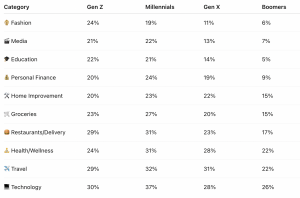What Gen Alpha Is Teaching Us About AI, Trust, and the Future of Brand Relationships

A new generation is emerging—one that doesn’t just use technology, but builds relationships with it. What Gen Alpha is teaching us about AI, trust, and branding.
Brand strategist Luca Bertocci explores how Gen Alpha is reshaping AI, friction, and trust—and credits key voices driving the conversation forward.
Titled “When Technology Becomes a Relationship: What Gen Alpha Is Teaching Us About AI and the Future of Marketing,” the piece explores the implications of AI as a relational presence rather than a functional tool. It combines cultural insight, real-time experimentation, and consumer data to examine how brands must evolve in an age of emotionally intelligent technology.
The article draws on recent thinking by Abby Ho (Fellow Kids newsletter), Sara Wilson (SW Projects), and Kyla Scanlon (creator and economic analyst), continuing a growing dialogue about AI’s cultural and behavioral impact. It is published by Human Centric Group, a London-based strategy consultancy known for its human-centered approach to branding and innovation.
From Family Moment to Market Signal
The article centers on a simple experiment: using ChatGPT’s voice and video mode to interact with two young children in English, Italian, and Polish. What emerges is more than a test of AI capabilities. It’s a glimpse into how younger generations intuitively treat technology as a companion, not just a command center.
The child–AI interaction revealed fluid language switching, curiosity-driven questioning, and emotional engagement, especially in English. In other languages, technical accuracy remained, but emotional warmth fell short.
These early behaviors, the article suggests, offer a preview of future consumer expectations: frictionless design, adaptive tone, and presence over performance.
“This isn’t about voice mode as a feature. It’s about AI as a presence,” the article notes. “Marketing is shifting from campaign-driven to companion-driven.”
Rethinking Friction, Trust, and Taste
Through the lens of Gen Alpha and insights from leading thinkers, the article identifies three cultural forces shaping AI engagement:
• Frictionless digital systems engineered by platforms
• Eroding physical systems that drive disillusionment
• Curated luxury environments where friction is a status symbol
As Abby Ho wrote, “friction is now a luxury; taste is a survival skill.” In this context, the article argues that brands must become curators of trust—offering emotionally intelligent, culturally fluent, and context-aware experiences.
Insights Backed by Consumer Data
To support its argument, the article integrates fresh analysis from Human Centric Group’s elaboration of GWI Zeitgeist data (June 2025), covering the UK and U.S. markets. The findings confirm that:
• Gen Z shows the highest interest in AI support for identity-driven needs like fashion and education
• Millennials lead in practical areas like tech and wellness
• Boomers remain more reserved, especially in categories tied to personal finance and food
These trends suggest that brands must not only segment by generation—but design for emotional mindset, context, and trust.
Context for Brand and Innovation Leaders
The article contributes to a fast-developing conversation about how AI is reshaping the way consumers interact with technology, brands, and each other. It emphasizes the need for brands to move beyond efficiency and personalization toward adaptive presence, where content is not just delivered, but felt.
It is available in full at Human Centric Group blog.
About the author
Luca Bertocci is a co-founder and co-owner of Human Centric Group, where he partners with boards, founders, and C-level executives to transform brands into strategic business assets. He leads the agency’s analytical department, applying a data-driven approach to unlock sustainable, long-term value for global clients such as Carlsberg, PepsiCo, Danone, Mitsubishi Electric, and Carrefour, across more than 30 countries.
Before Human Centric Group, Luca was an equity partner at Garrison Group and held key roles at Pirelli Tyres and Desk Promos (special agency of the Italian Chamber of Commerce) during Expo Shanghai 2010.
Beyond consulting, Luca is a lecturer at Krakow School of Business (International MBA), and AGH Business School (EMBA and Tech MBA). He also serves as a mentor for Bocconi University and for several startups in Poland, combining entrepreneurial spirit with academic rigor.
Media Enquiries
HUMAN CENTRIC GROUP LTD
+44 20 3693 4480
community|humancg.com| |community|humancg.com
Visit us on social media:
LinkedIn
Instagram
TikTok
X
Legal Disclaimer:
EIN Presswire provides this news content "as is" without warranty of any kind. We do not accept any responsibility or liability for the accuracy, content, images, videos, licenses, completeness, legality, or reliability of the information contained in this article. If you have any complaints or copyright issues related to this article, kindly contact the author above.
Balfour Capital Welcomes Safder Shakil as Investment Advisor
AI That Never Sleeps: Quarero Robotics Unveils Fully Autonomous Solution for 24/7 Smart Surveillance
A' International Cybernetics, Prosthesis and Implant Design Awards Call for Entries
Więcej ważnych informacji
 Jedynka Newserii
Jedynka Newserii

 Jedynka Newserii
Jedynka Newserii

Konsument

Tylko 35 proc. Celów Zrównoważonego Rozwoju ONZ możliwe do osiągnięcia przed 2030 r. Potrzebna ściślejsza współpraca międzynarodowa
Jak wynika z raportu ONZ, choć w ciągu ostatniej dekady dzięki dążeniu do realizacji przyjętych celów udało się poprawić życie milionów ludzi na całym świecie, to jednak tempo zmian pozostaje zbyt wolne, by dało się je osiągnąć do 2030 roku. Postęp hamują przede wszystkim eskalacja konfliktów, zmiana klimatu, rosnące nierówności i niewystarczające finansowanie. Jak wynika ze sprawozdania Parlamentu Europejskiego, problemem jest także brak ścisłej współpracy międzynarodowej i sceptyczne podejście niektórych państw ONZ.
Przemysł spożywczy
UNICEF: Wszystkie dzieci poniżej piątego roku życia w Gazie cierpią z powodu niedożywienia. Sytuacja jest katastrofalna

Ataki Izraela na Strefę Gazy i jej izolacja doprowadziły do całkowitego załamania podstawowych usług i ograniczenia możliwości dostaw i dystrybucji pomocy humanitarnej – wskazuje UNICEF. W efekcie setki tysięcy Palestyńczyków są w sytuacji ciągłego zagrożenia życia i cierpią z powodu niedożywienia i głodu. Ta klęska dotyczy praktycznie wszystkich dzieci poniżej piątego roku życia. Konflikty są jednym z głównych przyczyn braku bezpieczeństwa żywnościowego, głodu i niedożywienia na świecie. Szczególnie dotyczy to Afryki i Azji Zachodniej.
Prawo
Branża ciepłownictwa czeka na unijną i krajową strategię transformacji. Liczy na większe fundusze i korzystne regulacje

Komisja Europejska zapowiedziała rozpoczęcie w I kwartale 2026 roku prac nad strategią dla ciepłownictwa i chłodnictwa. Nad tym strategicznym dokumentem w zakresie ciepłownictwa pracuje także polski rząd. Branża podkreśla, że obie te strategie będą miały kluczowe znaczenie dla trwającej transformacji w ciepłownictwie, czyli przyszłości ogromnych inwestycji, które czekają sektor do 2050 roku. Jednocześnie apeluje o większe wsparcie tego procesu ze środków publicznych.
Partner serwisu
Szkolenia

Akademia Newserii
Akademia Newserii to projekt, w ramach którego najlepsi polscy dziennikarze biznesowi, giełdowi oraz lifestylowi, a także szkoleniowcy z wieloletnim doświadczeniem dzielą się swoją wiedzą nt. pracy z mediami.



![Nestlé w Polsce podsumowuje wpływ na krajową gospodarkę. Firma wygenerowała 0,6 proc. polskiego PKB [DEPESZA]](https://www.newseria.pl/files/1097841585/fabryka-nesquik_1,w_85,r_png,_small.png)






.gif)

 |
| |
| |
|